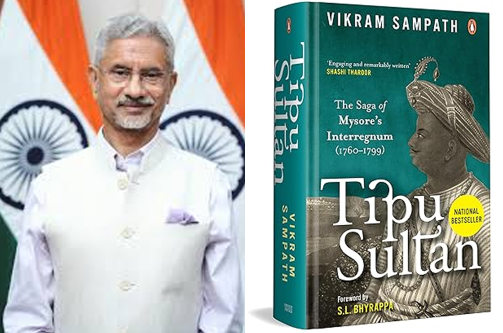- Web
- Feb 20, 2026
“Tipu Sultan” ignites debate in India as polarizing new book hits shelves
-

- Web Desk
- Dec 02, 2024

NEW DELHI: Accomplished historian Vikram Sampath released his latest book on the eighteenth century Indian ruler, titled “Tipu Sultan-The Saga of the Mysore Interregnum 1761-1799”.
While most of history remembers Tipu Sultan as a fearless defender of his people against the East India Company. Even today, India and Pakistan of the sub-continent, remember the Sher-e-Mysore or “Tiger of Mysore” for his bravery and military accomplishments.
However, in India, the book and its protagonist, have reignited the debate on the accuracy of historical accounts and what do they mean for modern day India.
Gold falls as US dollar strengthens, markets brace for Fed’s next move
Indian External Affairs Minister Subrahmanyam Jaishankar attended the book launch event, where he highlighted this growing discussions around the controversies of historical figures. An Indian publication quoted him as saying, “Tipu Sultan is actually a very, very complex figure in history. On the one hand, he has the reputation as a key figure who resisted the British colonial control over India, and it is a fact that his defeat and death can be considered a turning point when it came to the fate of peninsular India”.
However, “…politics of the day often indulges in cherry-picking facts”, the minister said, adding that to some extent that has happened with Tipu Sultan as well. He said that the current political environment of India has allowed alternative perspectives on history to emerge, independent of any concerns of a vote bank or the need to hide “inconvenient truths”.
Touching upon the dichotomy in “foreign relations” of Tipu Sultan’s rule, Jaishankar said that while he is renowned for his opposition of the British, his alliances with the French at the time make it difficult for a straightforward interpretation of his legacy. He also spoke on Tipu Sultan’s religious ties with Turkey, Afghanistan and Persia that show how the concept of nationhood was different at that time.
The book itself, sheds light on the rule as much as the ruler. Some excerpts shared by Indian publications show that Sampath’s book details how Tipu Sultan ascended to the throne – mostly through an accidental elevation – but with the need to fill the shoes of his father Haidar Ali who – during Anglo-Mysore Wars – brought the British down to their knees in such humiliating terms that even shook the crown back in London.
Global oil prices edge higher as China’s factory activity picks up
Moreover, while Haidar had to fight for his seat at the helm of the kingdom, Tipu had to wage wars while sitting on the throne to do justice to his father’s legacy. The war thirst of his time, although impressive in military might, have left a terrifying trail of destruction and death – now garnering more attention than his bravery when it comes to remembering his rule. “And yet, one simply cannot deny his position as a renowned military warrior and one of the most powerful rulers of Southern India.”




